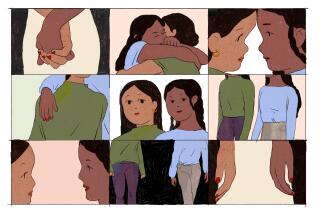Celebration, Skepticism Mark Ethiopia ‘Victory’
ADDIS ABABA, Ethiopia — This ancient African nation, poor but fiercely proud of its record in defeating foreign invaders, erupted in clamorous thanksgiving Thursday at news that its latest foe, Eritrea, was withdrawing from disputed lands occupied for two years.
“Whoever our enemy is, Ethiopia always wins,” said a jubilant Mikhal Negas, a 32-year-old communications technician, as tens of thousands gathered here in the capital. “Ethiopia is truly a lion!”
But even amid the celebration, the Ethiopian government quickly heaped scorn on the Eritrean declarations, and officials in both countries said the fighting will go on.
“This is consistent with Eritrean behavior,” Ethiopian government spokeswoman Selome Tadesse said. “Whenever they are defeated, they say they are withdrawing.”
Eritrea, reeling from a 13-day Ethiopian offensive involving tens of thousands of soldiers backed by artillery and helicopter gunships, announced Thursday morning that “for the sake of peace” and in line with an appeal from the Organization of African Unity, or OAU, it was pulling out of the territories it had held since May 1998.
“We started the implementation at midnight,” Yemane Gebremeskel, a top advisor to Eritrean President Isaias Afwerki, told reporters in Asmara, the capital. “We have taken up new defense positions out of the disputed area.”
The 2-year-old war has escalated to become Africa’s most lethal, and mediators from the OAU and the European Union have been flying between the capitals this week, trying to broker an end to hostilities.
The Ethiopian government’s dismissive stance toward the withdrawal announcement did not diminish the deafening chorus of car horns and columns of joyful, jogging citizens that spontaneously formed across this city of 3 million.
Meskel Square, a vast, sun-blasted expanse often used for patriotic ceremonies, filled at midmorning with singing children clad in red school sweaters and blue vests and adults, like the stubble-chinned Negas, who left their jobs in offices and shops to celebrate.
“We are one of the most powerful countries in the world!” chanted youngsters who crammed into slow-moving city buses and waved Ethiopia’s yellow, red and green flag and leafy tree branches.
Some youths shouted slogans denouncing the United States, believed by Ethiopians not to have explicitly condemned Eritrea’s May 6, 1998, seizure of sections of the poorly demarcated border, the action that sparked the conflict.
According to the Ethiopians, it was their troops’ bravery, and not Eritrea’s purported quest for peace, that resulted in the latest major development in the war. Eritrea’s announcement followed the reported recapture late Wednesday of the key market town of Zalambessa in the central section of the 600-mile border. Before the Eritrean occupation, the town and nearby countryside had been in Ethiopian hands.
Officials here said Eritrean soldiers still occupy pockets of land claimed by Ethiopia at the eastern end of the frontier, near the former French colony of Djibouti.
“The war will end when all of our territory has been liberated,” said Tadesse, the Ethiopian spokeswoman.
“I don’t think Ethiopia will go the extra mile, so I think the war will continue,” predicted Gebremeskel, the Eritrean official.
Eritrea’s announcement represented a concession in itself, since the small country on the Red Sea had previously insisted on a formal cease-fire agreement before relinquishing any land. But veteran Africa hands in the diplomatic community here were dubious that even total withdrawal to the positions held before the war would end a conflict that has cost tens of thousands of lives.
“They [the Ethiopians] need the Eritreans to say ‘uncle,’ ” a Western diplomat said Thursday. “The Eritreans need to say that they were wrong, and their announcement today doesn’t meet that test of humiliation.”
Diplomats believe that the Ethiopians want to smash the Eritrean army--300,000 strong, or nearly 8% of the country’s population--to prevent more trouble in the future.
Ethiopia has far more people than Eritrea--about 60 million versus about 4 million. But Western military analysts here say that its military, at 350,000 troops, is comparable in size.
In the Clinton administration’s eyes, the war--which pits two of the world’s poorest countries against each other for a bleak border strip without oil or other natural wealth--is a pointless squandering of lives and meager national resources. In Eritrea, more than 500,000 people reportedly have been driven from their homes since the conflict began. Three years of back-to-back drought have brought an estimated 1 million people in Eritrea and 8 million in Ethiopia to the brink of starvation.
Here in Ethiopia, however, there is no antiwar movement to speak of, and young and old alike say there is a need to defend the country’s honor, sovereignty and territory. Some of those who thronged Meskel Square on Thursday mentioned another glorious chapter in their country’s history: the battle of Adwa more than a century ago. That rout of an Italian colonial army by Emperor Menelik II on March 2, 1896, gave Ethiopia a unique status in sub-Saharan Africa--that of a sovereign, black-ruled country that was permitted to deal with the European powers as an equal.
“This is not the first time we’ve won a war,” Iyob Lamma, a 37-year-old actor in traditional Ethiopian drama, said as he mingled with the crowd. “Whenever Ethiopia has fought in the past, we have been victorious.”
On the eve of World War II, Italian fascist dictator Benito Mussolini finally succeeded in conquering Ethiopia, but he was driven out after five years by British troops and Ethiopian guerrillas loyal to Emperor Haile Selassie.
The current war has pitted one of Africa’s oldest nations against the continent’s newest sovereign land. According to oral tradition, and another cause for Ethiopians’ pride and sense of nationhood, this country was settled by the great-grandson of Noah and was the realm of the Queen of Sheba. Moses, according to the Bible, married a woman from Ethiopia, which was then known as Cush.
As for Eritrea, it achieved independence from Ethiopia only seven years ago this month, after a long guerrilla war against the former Marxist dictatorship of President Mengistu Haile Mariam. Issues left unsettled by the separation, including precise delineation of borders, the status of dual nationals and the division of assets, fueled animosities that ultimately led the neighbors into war.
More to Read
Sign up for Essential California
The most important California stories and recommendations in your inbox every morning.
You may occasionally receive promotional content from the Los Angeles Times.










